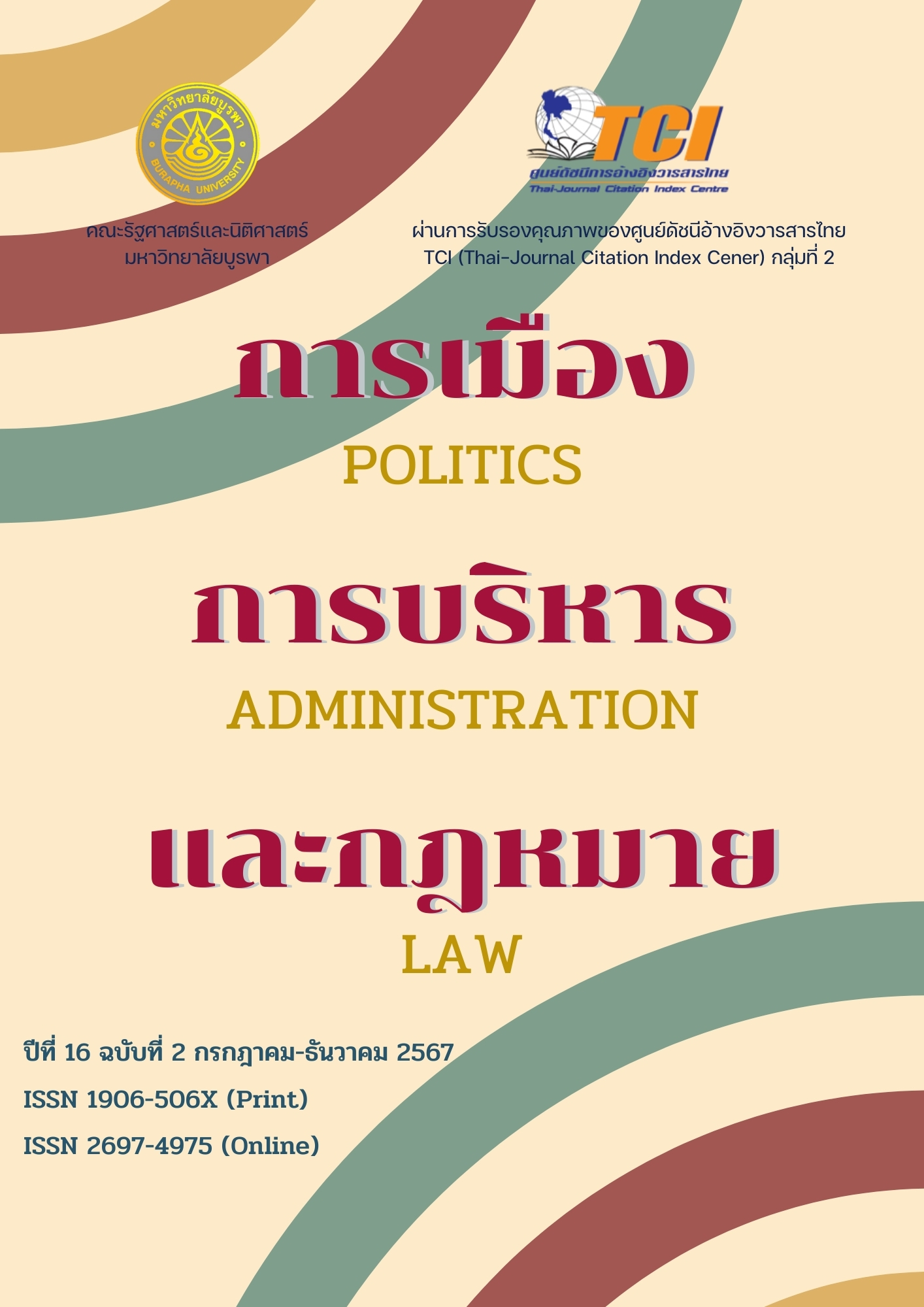Deliberative Democracy and the Learning Process for the Coexistence of Local Community and Industry in the Case of Islamic Community in Map Ta Phut Subdistrict, Mueang District, Rayong Province
Keywords:
Deliberative Democracy, Community Innovation, Map Ta PhutAbstract
This research study aims to analyze the factors influencing the creation of community innovation for coexistence between communities and industrial factories. It also examines the role of community innovation in fostering coexistence processes between communities and industrial factories. The conceptual framework used to understand this social phenomenon is the concept of deliberative democracy. The research methodology employed qualitative methods, collecting data from documents and interviews and triangulating the information. The findings revealed that within the context of Islamic communities, deliberative democracy emerges from interactions among four types of capital: (1) Economic Capital: This attracts stakeholders to interact in order to protect and maintain economic benefits. (2)Social Capital: This links social relationships among stakeholders. (3) Symbolic Capital: This encourages industrial entrepreneurs to participate. (4) Environmental Capital: This drives all stakeholders to recognize and address issues. The mechanism of deliberative democracy demonstrates power and capabilities in creating coexistence processes between communities and industrial factories in four dimensions: (1) It serves as a communication space between stakeholders and industrial development in Islamic communities where no one owns or leads. (2) It acts as a tool to strengthen the power of both local communities and industrial factories. (3) It serves as a tool for genuine participation in development. (4) It serves as a learning space between local communities and industrial factories. However, the process of deliberative democracy has several weaknesses and limitations: (1) Participants (community representatives) are often specific network leaders. (2) It is limited to one Islamic community, while there are up to 38 communities established in the Map Ta Phut Municipality. (3) Development projects resulting from consultations do not lead to structural changes. (4) The consultation process is bilateral. (5) The driving force often comes from personal relationships.
References
ภาษาไทย
จุฑารัตน์ ชมพันธุ์. (2555). การวิเคราะห์หลัก “การมีส่วนร่วมของประชาชน” ใน “The Public Participation Handbook: Making Better Decisions through Citizen Involvement”ในบริบทประเทศไทย. วารสารการจัดการสิ่งแวดล้อม, 8(1), 123-141.
ชัยณรงค์ เครือนวน. (2558ก). ปฏิบัติการและการต่อสู้ทางวาทกรรมในการพัฒนาอุตสาหกรรม: ศึกษากรณี การพัฒนาอุตสาหกรรมภายใต้ตัวแบบมาบตาพุด. ดุษฎีนิพนธ์หลักสูตรรัฐศาสตรดุษฎี บัณฑิต, สาขาวิชาเศรษฐศาสตร์การเมืองและการบริหารจัดการ, คณะรัฐศาสตร์และนิติศาสตร์, มหาวิทยาลัยบูรพา.
ชัยณรงค์ เครือนวน. (2558ข). ปฏิบัติการและการต่อสู้ทางวาทกรรมในการพัฒนาอุตสาหกรรม: ศึกษา กรณีการพัฒนาอุตสาหกรรมภายใต้ตัวแบบมาบตาพุด. วารสารการเมือง การบริหาร และกฎหมาย 7(2), 223-245.
ชัยณรงค์ เครือนวน. (2560). การทบทวนและปรับยุทธศาสตร์การพัฒนาของโครงการพัฒนาพื้นที่ชายฝั่ง ทะเลตะวันออกสู่การเป็นประเทศอาเซียนในจังหวัดระยอง: กรณีการปรับยุทธศาสตร์การพัฒนาอุตสาหกรรมในเขตมาบตาพุด. ชลบุรี: คณะรัฐศาสตร์และนิติศาสตร์ มหาวิทยาลัยบูรพา.
ชัยณรงค์ เครือนวน และพิมพ์ประไพ สนิทวงศ์ ณ อยุธยา. (2561). ข้อเสนอการพัฒนาอุตสาหกรรมพื้นที่ชายฝั่งทะเลตะวันออกในมุมมองของภาคประชาชน บทสังเคราะห์เพื่อการเปลี่ยนผ่านสู่การ พัฒนาระเบียงเศรษฐกิจพิเศษภาคตะวันออกให้เกิดความยุติธรรมทางสังคม. วารสาร เศรษฐศาสตร์การเมืองบูรพา, 6(1), 40-62.
ชัยยนต์ ประดิษฐศิลป์และชัยณรงค์ เครือนวน. (2549). การจัดทำผังพิสัยการวิจัยระบบสุขภาพกับการพัฒนา อุตสาหกรรมในอนุภาคตะวันออก. ศูนย์จัดการงานวิจัยระบบสุขภาพภาคตะวันออก (ศวรส.อ) มหาวิทยาลัยบูรพา สถาบันวิจัยระบบสาธารณสุข (สวรส.).
ชัยยนต์ ประดิษฐศิลป์ ชัยณรงค์ เครือนวน และจิตรา สมบัติรัตนานันท์ (2564). การใช้อำนาจรัฐในการจัดระบบที่ดินของระเบียงเศรษฐกิจพิเศษภาคตะวันออก. สำนักงานคณะกรรมการส่งเสริมวิทยาศาสตร์ วิจัยและนวัตกรรม (สกสว.) และสำนักงานการวิจัยแห่งชาติ (วช.).
ชาย โพธิสิตา. (2554). ศาสตร์และศิลป์แห่งการวิจัยเชิงคุณภาพ (พิมพ์ครั้งที่ 5). กรุงเทพฯ: อมรินทร์พริ้นติ้งแอนด์พับลิชชิ่ง.
ธเนศ วงศ์ยานนาวา. (2549). ฐานทางความคิดของประชาธิปไตยแบบปรึกษาหารือ. วารสารสถาบัน พระปกเกล้า, 4(3). 77-90.
ภาษาอังกฤษ
Putnam, R. (ed.). (2002). Democracies in Flux: The Evolution of Social Capital in Contemporary Society. Oxford: Oxford University Press
Downloads
Published
Issue
Section
License

This work is licensed under a Creative Commons Attribution-NonCommercial-NoDerivatives 4.0 International License.






